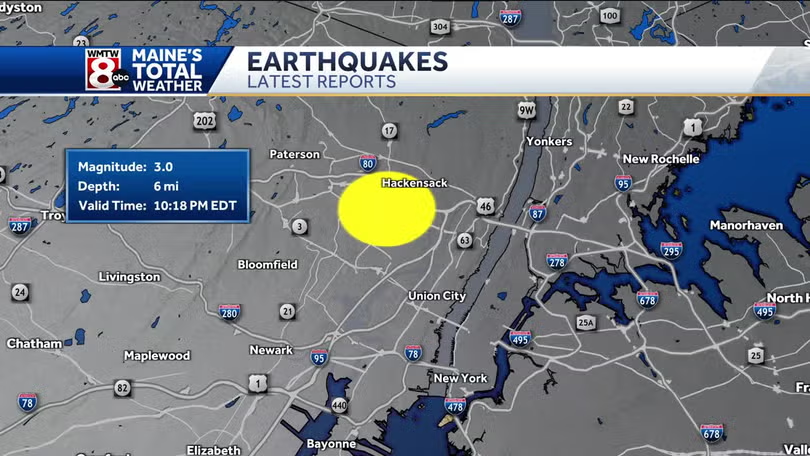A late-night rumble sent shockwaves—literally and figuratively—throughout New Jersey and parts of New York this weekend. At precisely 10:18 p.m. on Saturday, August 2, a magnitude 3.0 earthquake struck Hasbrouck Heights in Bergen County, marking the second seismic event to hit the Garden State in less than two weeks.
While New Jersey is no stranger to occasional tremors, this latest earthquake once again brings the state’s underlying seismic activity into the spotlight. Although no damage has been reported so far, the unexpected quake was powerful enough to be felt as far as New York City, the Lower Hudson Valley, and even western Connecticut.
Residents described feeling a brief, yet unmistakable shaking that rattled windows, floors, and nerves alike. Given the quake’s 3.0 magnitude, many locals were surprised by how far-reaching the vibrations traveled—roughly 65 miles from its epicenter.
For ongoing updates and weather-related alerts, visit our Local Weather Report.
New Jersey’s Second Earthquake in Two Weeks
This Bergen County earthquake follows closely on the heels of a series of small quakes near Morris Plains on July 21 and 22. That sequence began with a 1.6 magnitude tremor, followed by five aftershocks—the largest of which registered a 2.0 magnitude. Though minor, those quakes reminded North Jersey residents that the state’s bedrock occasionally stirs beneath their feet.
While earthquakes in New Jersey rarely make national headlines, they occur more frequently than many people realize. The Ramapo Fault Line, a major fault system that slices through the northern and central parts of the state, is often responsible for these subtle shifts. Most of these quakes are minor, rarely reaching beyond a 2.0 or 3.0 magnitude, and are often only felt locally near their epicenters.
No Major Damage, but Aftershocks Remain Possible
As of now, there are no reports of structural damage or injuries. However, aftershocks are still a possibility over the coming days. Earthquake experts often warn that aftershocks, while typically smaller, can occasionally surprise with more noticeable jolts than the initial event.
For the residents of Bergen County and surrounding areas, it’s a reminder to stay alert, even when the ground seems steady.
A History of Earthquakes in the Tri-State Area
Though the Garden State isn’t synonymous with seismic activity, history tells us that the occasional significant quake is not out of the question. One of the more memorable events occurred on April 5, 2024, when a magnitude 4.8 earthquake rocked Tewksbury, New Jersey. That quake sent office buildings swaying in Manhattan and was reportedly felt by over 42 million people along the East Coast, stretching from Maine to Virginia.
That particular quake was followed by a staggering 205 aftershocks, including a notable 3.7 magnitude tremor that struck just seven hours after the main event. It stands as New Jersey’s second-strongest earthquake in recorded history, surpassed only by the infamous 1783 quake in Cape May County, which registered a 5.3 magnitude.
For a region not known for major quakes, events like these reignite conversations about earthquake preparedness and geological awareness in New Jersey.
Stay up-to-date with the latest developments and emergency alerts by following our Weather Report section.
What Causes Earthquakes in New Jersey?
Unlike California’s infamous San Andreas Fault or Japan’s Pacific Ring of Fire, New Jersey’s seismic activity stems from intra-plate fault systems like the Ramapo Fault. These faults are ancient fractures in the Earth’s crust, and while they don’t produce the colossal quakes seen in tectonically active regions, they’re capable of generating noticeable tremors from time to time.
Experts estimate that New Jersey experiences several small earthquakes each year, most of which go unnoticed by residents. However, quakes like Saturday’s 3.0 magnitude event serve as a reminder that New Jersey’s bedrock remains geologically active, even if on a smaller scale.
Preparing for the Unpredictable
While large-scale earthquakes remain rare in New Jersey, small quakes like the one in Bergen County should encourage residents to consider basic earthquake preparedness:
- Ensure heavy furniture is secured.
- Know safe spots indoors, such as under sturdy tables.
- Keep emergency kits ready with essentials.
- Stay informed through reliable sources, like our dedicated Weather Report updates.
Given the unpredictability of seismic events, even minor preparedness steps can make a significant difference.
Closing Thoughts: New Jersey’s Quiet, Persistent Fault Lines
Though the tremors that ripple through New Jersey are usually small and fleeting, they are a subtle reminder of the powerful forces moving deep beneath us. From Hasbrouck Heights to the Lower Hudson Valley, Saturday night’s earthquake once again underscores the quiet persistence of New Jersey’s seismic personality.
For continuous coverage of local weather incidents, earthquakes, and emergency alerts, be sure to bookmark our Weather Report section. We’ll keep you informed when the earth decides to shake things up again.












